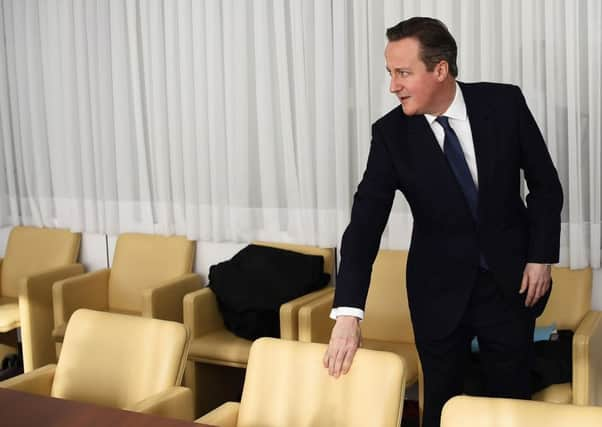Cameron and EU leaders agree a deal in Brussels negotiations


The development came late on the second day of gruelling talks in Brussels between leaders of the 28 member-states, which saw the Prime Minister face opposition to proposals to restrict migrant benefits and provide new protections for countries outside the single currency.
Lithuanian president Dalia Grybauskaite broke the news in a tweet from the round-table discussions: “Agreement #UKinEU done. Drama over.”
Advertisement
Hide AdAdvertisement
Hide AdDanish PM Lars Lokke Rasmussen said: “David Cameron fought hard for Britain. Good deal for UK and for EU. Congrats!”
Minutes later, the breakthrough was officially confirmed by European Council president Donald Tusk, who said: “Deal. Unanimous support for new settlement for UK in EU.”
The agreement clears the way for David Cameron to return immediately to London and call a special Cabinet meeting today to endorse the deal and set a date for the long-awaited referendum which is widely expected to come on 23 June. The meeting will also give a green light to Eurosceptic ministers such as Iain Duncan Smith and Chris Grayling to go out and campaign for Britain to leave Europe, and put pressure on waverers like London mayor Boris Johnson and Justice Secretary Michael Gove to spell out where they stand.
Sources close to Mr Gove declined to comment on increasingly confident reports that the Justice Secretary is preparing to throw his weight behind Brexit.
The deal came after behind-the-scenes talks which stretched through Thursday night and most of yesterday, as Mr Cameron and Mr Tusk struggled to keep Britain’s renegotiation on track.
The key changes will mean that:
• A proposed emergency brake on EU migrants claiming in-work benefits will last for seven years. It will apply on an individual for no more than four years, and will be phased out after the first year. But the UK will be allowed to apply the overall restrictions for seven years.
• Restrictions on child benefit for EU migrants will kick in at a reduced rate – indexed to the rate of a migrant’s home country – for new migrants with immediate effect. Existing EU migrants will be paid at the lower rate from 2020. Eastern European countries had hoped to exempt existing migrants altogether.
Advertisement
Hide AdAdvertisement
Hide Ad• Britain has a specific opt-out from the EU’s historic commitment to forge an “ever closer union of the peoples of Europe”.
• One country – effectively Britain – will have the right to impose a handbrake to refer contentious financial regulation to a meeting of EU leaders in the European Council.
The 28 leaders had initially been due to gather early in the morning for an “English breakfast” meeting to approve a package of reforms to the UK’s membership, but breakfast became brunch, lunch, then dinner as opponents of the deal dug in their heels.
The delays forced Mr Cameron to scrap plans to summon ministers for a Cabinet meeting last night. He said in a message on Twitter: “Negotiations are continuing into this evening. A Cabinet meeting won’t be possible tonight. One will be held if and when a deal is done.”
Mr Cameron had faced concerns from eastern European countries such as Poland, Hungary, the Czech Republic and Slovakia over his call for an “emergency brake” on in-work benefits for migrant EU workers to extend for as long as 13 years.
The same nations put up stiff resistance to the UK’s demand to impose cuts in child benefits for offspring living abroad on 34,000 existing claimants as well as future migrants.
France and Austria voiced anxiety that the protections for non-euro states sought by Mr Cameron might effectively grant special status to the City of London and allow Britain to hobble future deepening of the eurozone.